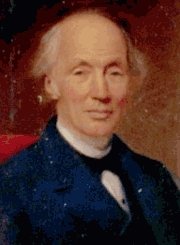On this date in 1801, Robert Dale Owen, oldest son of Robert Owen, was born at New Lanark, Scotland, his reformer father’s settlement. When his father bought a town in Indiana for $30,000 to experiment with a model community, Robert accompanied him to New Harmony, where he edited the New Harmony Gazette, with strong freethought overtones. Although the community failed within three years, it became known as a center for advances in education and scientific research. Residents established the first free library, a civic drama club and a public school system open to men and women.
After his father returned to Great Britain, Owen became a naturalized U.S. citizen. He worked with Frances Wright on many reforms and enterprises, including abolition, women’s rights, pacifism, editing The Free Enquirer and helping found the Working Men’s Party. In 1835 Owen was elected to the Indiana Legislature and in 1843-47 served in the U.S. House of Representatives, where he played a key role in promoting public education, in part by supporting the founding of the Smithsonian Institution.
Owen represented the U.S. as a diplomat in Naples for several years. On Sept. 17, 1862, he wrote President Lincoln to urge him to use his power to end slavery. Five days later, Lincoln issued the Emancipation Proclamation. To the concern of fellow freethinkers, Owen toyed with the spiritualism movement but was eventually disillusioned by it. His books include several on abolitionism and his autobiography Threading My Way (1874).
He married Mary Jane Robinson before a justice of the peace In New York City in 1832. After an extended trip to Europe, they relocated to New Harmony and had six children. His wife died in 1871 and he married Lottie Walton Kellogg in 1876, a year before he died at age 75 in Lake George, N.Y. (D. 1877)


